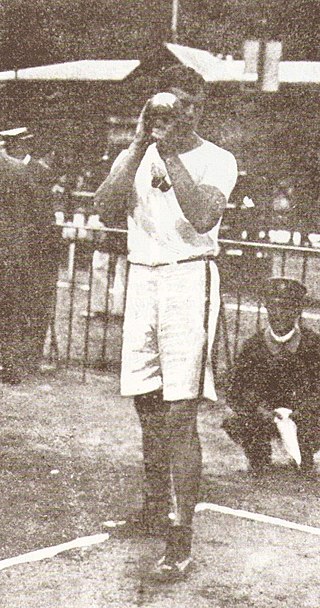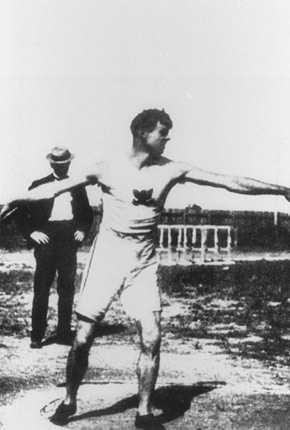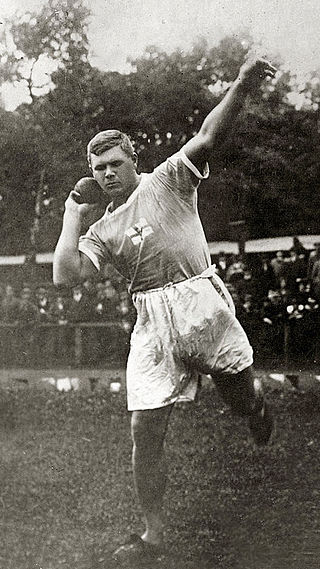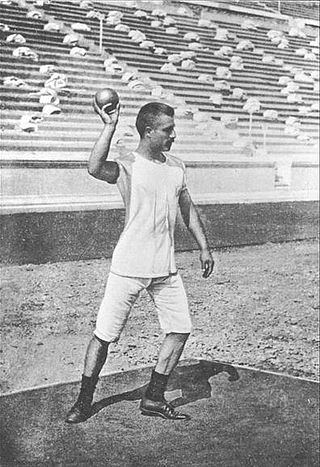
Athletics has been contested at every Summer Olympics since the birth of the modern Olympic movement at the 1896 Summer Olympics. The athletics program traces its earliest roots to events used in the ancient Greek Olympics. The modern program includes track and field events, road running events, and race walking events. Cross country running was also on the program in earlier editions but it was dropped after the 1924 Summer Olympics.

The men's shot put was a track & field athletics event at the 1900 Summer Olympics in Paris. It was held on July 14 and July 15, 1900. 11 shot putters from five nations competed. The event was won by Richard Sheldon of the United States, the nation's second consecutive victory in the men's shot put. Josiah McCracken took silver and Robert Garrett took bronze, completing an American medal sweep.

The men's discus throw was a track & field athletics event at the 1900 Summer Olympics in Paris. It was held on July 14 and July 15, 1900. 17 discus throwers from nine nations competed. The event was won by Rudolf Bauer of Hungary, the nation's first victory in the men's discus throw. František Janda-Suk gave Bohemia its first medal in the event, also in that nation's first appearance. Richard Sheldon's bronze put the United States in the top three for the second consecutive Games.

The men's hammer throw was a track & field athletics event at the 1900 Summer Olympics in Paris, the discipline's first Olympic appearance. It was held on July 16, 1900. Five hammer throwers from two nations competed. The event was won by John Flanagan of the United States, the first of his three consecutive victories in the hammer throw. The American team swept the medals, with Truxtun Hare finishing second and Josiah McCracken third.
The men's shot put was one of two throwing events on the Athletics at the 1896 Summer Olympics programme. Seven athletes took part in the shot put competition on 7 April. The two Greek athletes both won medals, with Gouskos battling closely with Garrett of the United States for the longest distance.

The men's discus throw was one of six throwing events on the Athletics at the 1908 Summer Olympics programme in London. The competition was held on 16 July 1908. 42 throwers from eleven nations competed. NOCs could enter up to 12 athletes. The event was won by Martin Sheridan of the United States, his second consecutive victory in the event. The Americans completed their first sweep in the discus throw, with Merritt Giffin taking silver and Bill Horr bronze.

The men's hammer throw was one of six throwing events on the Athletics at the 1908 Summer Olympics programme in London. The competition was held on July 14, 1908. 19 throwers from eight nations competed. NOCs could enter up to 12 athletes. The event was won by American John Flanagan, his third consecutive victory in the event. He was the first man to win three medals in the hammer throw and, as of the 2016 Games, the only one to win three gold medals in the event. The silver medal went to fellow American Matt McGrath. Con Walsh of Canada took bronze and became the first athlete not from the United States to win a medal in the event, as the Americans had swept the podium in both 1900 and 1904. The three medalists were all part of the Irish Whales.

The men's shot put was one of six throwing events on the Athletics at the 1908 Summer Olympics programme in London. The competition was held on July 16, 1908. 25 shot putters from eight nations competed. NOCs could enter up to 12 athletes. The event was won by Ralph Rose, successfully defending his title from 1904 and making it four consecutive Games that the event was won by an American. The two-Games streak of sweeps in 1900 and 1904 ended, however, as Denis Horgan of Great Britain took silver. Johnny Garrels of the United States took bronze. Rose was the second man to win two medals in the shot put ; Wesley Coe nearly was the third as he ended up in 4th place, only 11 centimetres behind Garrels.

The men's 200 metres was a track and field athletics event held as part of the Athletics at the 1912 Summer Olympics programme. It was the fourth appearance of the event, which has appeared at every edition of the Summer Olympics since the 1900 Summer Olympics. The competition was held on July 10, 1912, and on July 11, 1912. 61 runners from 19 nations competed. NOCs could enter up to 12 athletes. The event was won by Ralph Craig of the United States, the nation's third victory in four Games. Another American, Donald Lippincott, took silver. Great Britain earned its first medal in the 200 metres with Willie Applegarth's bronze.

Wesley William Coe Jr., sometimes listed as William Wesley Coe Jr., was an American track and field athlete who competed principally in the shot put and also in the hammer throw, discus throw, and tug of war.

The men's 1500 metres was a track and field athletics event held as part of the Athletics at the 1904 Summer Olympics program. It was the third time the event was held. 9 runners from 3 nations participated. The competition was held on September 3, 1904. The event was won by Jim Lightbody of the United States, completing his 1904 treble. It was the first championship in the event for the United States. The Americans, with 7 of the 9 runners, swept the medals.

The men's discus throw was a track and field athletics event held as part of the Athletics at the 1904 Summer Olympics programme. It was the third time the event was held. The competition was held on Saturday, September 3, 1904. Six athletes from two nations competed.

The men's hammer throw was a track and field athletics event held as part of the Athletics at the 1904 Summer Olympics programme. It was the second time the event was held. The competition was held on Monday, August 29, 1904. Six athletes from the United States competed. John Flanagan, the reigning champion, defended his gold medal and set a new Olympic record. John DeWitt took silver and Ralph Rose bronze. It was the second consecutive medal sweep for the United States in the event. Flanagan was the first man to earn multiple medals in the event; he would finish with three consecutive victories, a record not matched by anyone in the hammer throw.

The men's 56 pound weight throw was a track and field athletics event held as part of the Athletics at the 1904 Summer Olympics programme. It was the first time the event was held. It would not appear on the Olympic program again until the 1920 Summer Olympics, which would be the last time the 56 pound weight was thrown in the Olympic Games. The competition was held on September 1, 1904. 6 athletes from 2 nations competed. The event was won by Étienne Desmarteau of Canada, one of only two gold medals in athletics won by an athlete not from the United States. Americans John Flanagan and James Mitchel took second and third, respectively.

The men's shot put was a track and field athletics event held as part of the athletics at the 1912 Summer Olympics programme. The competition was held on Wednesday, July 10, 1912. Twenty-two shot putters from 14 nations competed. NOCs could enter up to 12 athletes. The event was won by Pat McDonald of the United States, the nation's fifth consecutive victory in the men's shot put. The American team swept the top three places, the third time in five Games. Ralph Rose took silver, 9 centimetres shy of a third gold medal; he became the first man to win three medals of any color.

The men's shot put event was part of the track and field athletics programme at the 1920 Summer Olympics. The competition was held on Tuesday, August 17, 1920, and on Wednesday, August 18, 1920. Twenty shot putters from ten nations competed. No nation had more than 4 athletes, suggesting the limit had been reduced from the 12 maximum in force in 1908 and 1912. The event was won by Ville Pörhölä of Finland, the first time the men's shot put was won by someone not from the United States. Fellow Finn Elmer Niklander took silver. The Americans, who had won all five previous editions of the shot put, including three medal sweeps, settled for bronze by Harry B. Liversedge.

The men's shot put throwing event at the 1960 Olympic Games took place on August 31. Twenty-four athletes from 16 nations competed. The maximum number of athletes per nation had been set at 3 since the 1930 Olympic Congress. The event was won by Bill Nieder of the United States, the nation's fourth consecutive and 12th overall victory in the men's shot put. Parry O'Brien and Dallas Long took silver and bronze, giving the American team its sixth medal sweep in the event. O'Brien, who had won gold in 1952 and 1956, matched Ralph Rose in coming just shy of a third gold medal. The two remain, through the 2016 Games, the only men to win three shot put medals. Nieder was the fifth man to win two medals.

The men's shot put competition at the 2012 Summer Olympics in London, United Kingdom was held at the Olympic Stadium on 3 August. Forty athletes from 34 nations competed. The event was won by Tomasz Majewski of Poland, the nation's second consecutive and third overall victory in the men's shot put. Majewski was the third man to successfully defend Olympic shot put gold, both of whom added a silver medal after their two golds). David Storl of Germany took silver, the first medal for united Germany since 1936. Reese Hoffa took bronze to keep the American podium streak going at eight consecutive Games.

The shot put at the Summer Olympics is one of four track and field throwing events held at the multi-sport event. The men's shot put has been present on the Olympic athletics programme since 1896. The women's event was added to the programme at the 1948 Olympics just over fifty years later.

The discus throw is one of four track and field throwing events held at the Summer Olympics. The men's discus throw has been present on the Olympic athletics programme since 1896. The women's event was first contested at the 1928 Olympics, being one of the five athletics events in the inaugural Olympic women's programme.





















